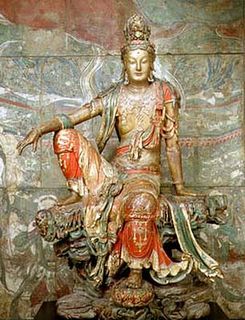Rabat Run
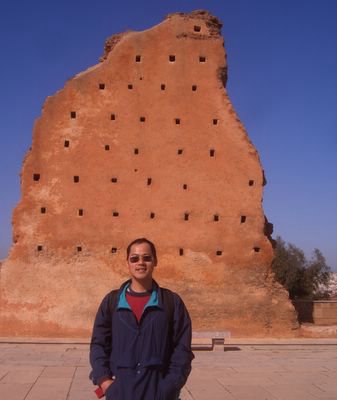 Last week, several volunteers were asked to come to Rabat for language-related activities. Though Rabat is fairly close to my site and I have been there before, this was my first opportunity to "see" the capital. The first time I came to the imperial city was September 13, 2005, with the new batch of Peace Corps Trainees-to-be-Volunteers; I can now appreciate the reasons for limiting our movement at the time. Rabat is not an especially dangerous city as capitals go, but, nonetheless, it is a metropolis and most of us did not have the cultural sensitivities and language skills to wander about the town on our own. For the language activities, most Volunteers arrived in Rabat a day ahead of the work-related day because of travel (no travel after dark policy); I decided to arrive on the morning of the language workday.
Last week, several volunteers were asked to come to Rabat for language-related activities. Though Rabat is fairly close to my site and I have been there before, this was my first opportunity to "see" the capital. The first time I came to the imperial city was September 13, 2005, with the new batch of Peace Corps Trainees-to-be-Volunteers; I can now appreciate the reasons for limiting our movement at the time. Rabat is not an especially dangerous city as capitals go, but, nonetheless, it is a metropolis and most of us did not have the cultural sensitivities and language skills to wander about the town on our own. For the language activities, most Volunteers arrived in Rabat a day ahead of the work-related day because of travel (no travel after dark policy); I decided to arrive on the morning of the language workday.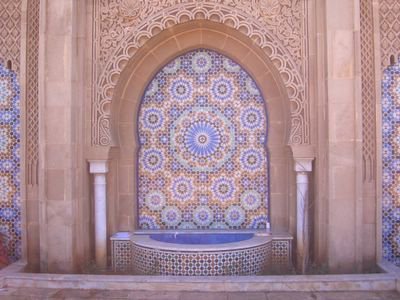 As my site is a thoroughfare, it was not difficult to find transportation going to Rabat. Grand taxis leave for Rabat about every 1/2 hour throughout the day, and about every 10 minutes during the busiest parts of the day (eary morning and at sundown). Taking a grand taxi1 is more expensive and more crowded (six passengers to a sedan) than bus, but it is much faster because there is no need to stop and pick up passengers villages and towns along the route. The grand taxi stand for Khemisset in Rabat is near the old medina and I got in rather early, so I leisurely walked up the main drag of Avenue Mohammed V to the hotel meeting point. From the hotel's rooftop, I could see the Great Mosque Es Sunna, and, squinting into the distance, could make out Rabat's twin-half Sale; I have yet to find a reason to visit Sale. I sat on the hotel's rooftop enjoying my morning coffee and reviewing vocabulary before heading down to the conference room.
As my site is a thoroughfare, it was not difficult to find transportation going to Rabat. Grand taxis leave for Rabat about every 1/2 hour throughout the day, and about every 10 minutes during the busiest parts of the day (eary morning and at sundown). Taking a grand taxi1 is more expensive and more crowded (six passengers to a sedan) than bus, but it is much faster because there is no need to stop and pick up passengers villages and towns along the route. The grand taxi stand for Khemisset in Rabat is near the old medina and I got in rather early, so I leisurely walked up the main drag of Avenue Mohammed V to the hotel meeting point. From the hotel's rooftop, I could see the Great Mosque Es Sunna, and, squinting into the distance, could make out Rabat's twin-half Sale; I have yet to find a reason to visit Sale. I sat on the hotel's rooftop enjoying my morning coffee and reviewing vocabulary before heading down to the conference room.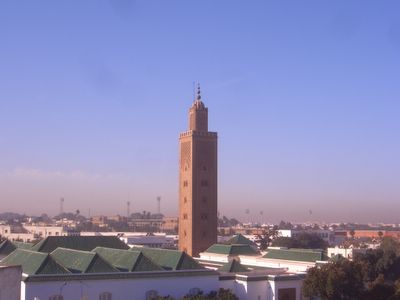 The training director briefly thanked us for making the trip (some volunteers had eight hours of travel to make it to the meeting), and explained the purpose of the meeting. The director needed Volunteers from a variety of background and language proficiency to prepare culture & language tutors for the next batch of Peace Corps Trainees. Though we were not tested on our language proficiency, I did get the sense that some Volunteers were competitive as they spontaneously conversed in their trained language; Volunteers learn one of three languages: Darija (Moroccan Arabic), Tamazight (Berber dialect) or Tashelhit (Berber dialect). Luckily for me the language training did not affect our service; otherwise, I would be mass-emailing of my premature return to the U.S. instead of recounting the Rabat run. I had not seen most of the other Volunteers since the Swearing-in Ceremony in late-November 2005, so it was good to catch up with them.
The training director briefly thanked us for making the trip (some volunteers had eight hours of travel to make it to the meeting), and explained the purpose of the meeting. The director needed Volunteers from a variety of background and language proficiency to prepare culture & language tutors for the next batch of Peace Corps Trainees. Though we were not tested on our language proficiency, I did get the sense that some Volunteers were competitive as they spontaneously conversed in their trained language; Volunteers learn one of three languages: Darija (Moroccan Arabic), Tamazight (Berber dialect) or Tashelhit (Berber dialect). Luckily for me the language training did not affect our service; otherwise, I would be mass-emailing of my premature return to the U.S. instead of recounting the Rabat run. I had not seen most of the other Volunteers since the Swearing-in Ceremony in late-November 2005, so it was good to catch up with them.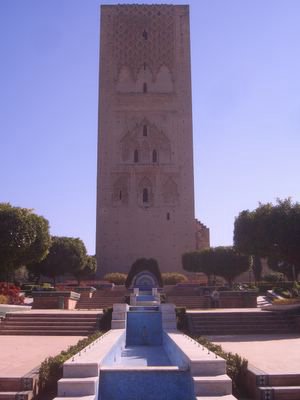 During a long break/lunch, some of us took a quick excursion to the tourist-magnet Hassan Tower. This is the unfinished minaret of the great Hassan Mosque, constructed by Yacoub el Mansour in the last five years of his reign after his victory over the kinds of Castile and Leon at Alarcos. The unfinished tower, numerous columns, ancient fortress wall, cloudless blue sky and the Atlantic Ocean as a backdrop provided an impressive, picturesque view. From this crest, visitors have a commanding view of both Rabat and Sale.
During a long break/lunch, some of us took a quick excursion to the tourist-magnet Hassan Tower. This is the unfinished minaret of the great Hassan Mosque, constructed by Yacoub el Mansour in the last five years of his reign after his victory over the kinds of Castile and Leon at Alarcos. The unfinished tower, numerous columns, ancient fortress wall, cloudless blue sky and the Atlantic Ocean as a backdrop provided an impressive, picturesque view. From this crest, visitors have a commanding view of both Rabat and Sale.Channeling a life before Peace Corps, Volunteer KW2, in jest, asked, "This is a great place to have a rave or concert, don't you think?"
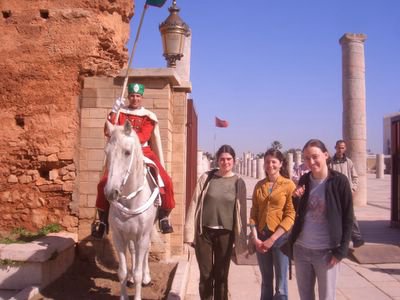
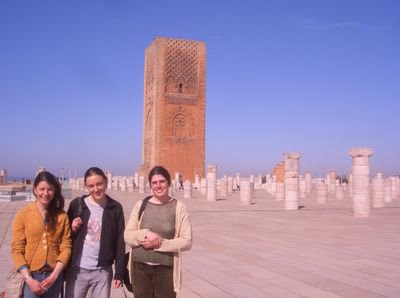
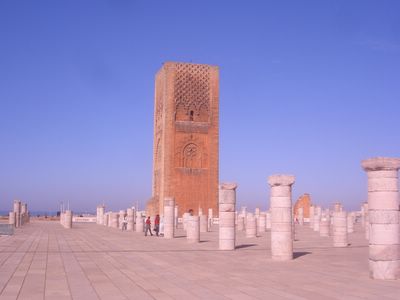

 As my session was after lunch, I left the others to find a hotel for the night before heading back to the conference room of the hotel-meeting point. I arrived with only moments to spare before the tutors came looking for me. The session was structured and uncomplicated. Before we started, I told them I have been under stress due to lack of finding decent housing. I was told to just relax and do my best, that this was not testing my language proficiency but helping the tutors to understand how best to help Trainees/Volunteers learn. Feedback on and priority of topics were important.
As my session was after lunch, I left the others to find a hotel for the night before heading back to the conference room of the hotel-meeting point. I arrived with only moments to spare before the tutors came looking for me. The session was structured and uncomplicated. Before we started, I told them I have been under stress due to lack of finding decent housing. I was told to just relax and do my best, that this was not testing my language proficiency but helping the tutors to understand how best to help Trainees/Volunteers learn. Feedback on and priority of topics were important.The tutors asked me a number of questions in Darija (my trained language) and took notes on my use of the language. I often had to use French when I did not have the vocabulary in Darija. I think I did ok, as they asked me only basic questions: where is my site, how many host brothers & sisters do I have, what am I doing in Morocco, which hotel am I staying in Rabat, how I was adjusting to Morocco, etc. Done with the interview, they said to enjoy the rest of the day, and to make sure I get back to my site before dark the next day.
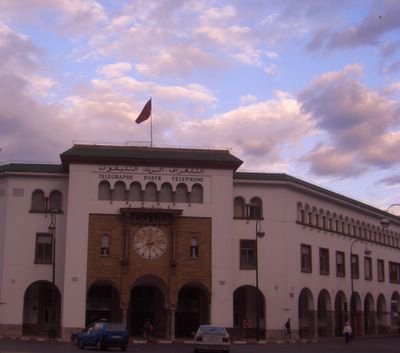 That night, I got together with other Volunteers for a nice dinner and to catch up on all that's happened since our arrival in Morocco. Volunteers from the previous year came to dinner with us, so they gave us sound advice on making the best of our Peace Corps experience, and, more immediately, on places to go in Rabat that night. We had dinner at the Goethe-Institut3, a restaurant-bar-gallery operated by the German consulate. The decor theme was 70's Americano with posters of Andy Warhol, Bruce Lee, James Dean, Elizabeth Taylor, etc. I felt out of place in there: beer on tap! ham on the menu! My Moroccan host-family would think it hshuma [shameful] for me to be in there!
That night, I got together with other Volunteers for a nice dinner and to catch up on all that's happened since our arrival in Morocco. Volunteers from the previous year came to dinner with us, so they gave us sound advice on making the best of our Peace Corps experience, and, more immediately, on places to go in Rabat that night. We had dinner at the Goethe-Institut3, a restaurant-bar-gallery operated by the German consulate. The decor theme was 70's Americano with posters of Andy Warhol, Bruce Lee, James Dean, Elizabeth Taylor, etc. I felt out of place in there: beer on tap! ham on the menu! My Moroccan host-family would think it hshuma [shameful] for me to be in there!Accustomed to getting up early4, I checked out of my hotel5 early the next morning and took a walk down to the medina. Except for a few cafes nothing was open at that hour, and so I wandered about aimlessly down one of the spines of the medina. Serendipitously, I came upon a cemetery, and beyond the vast cemetery was the sentinel lighthouse of Rabat. The cemetery seemed more serene with the oceanscape rather than the cityscape behind it. You be the judge.
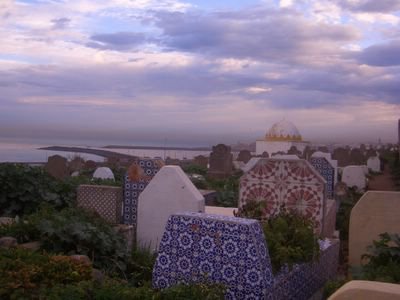
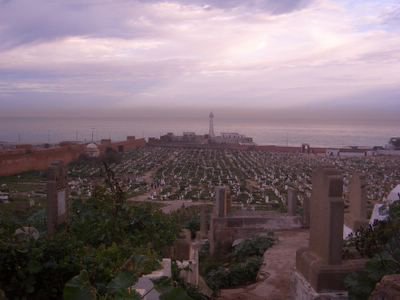
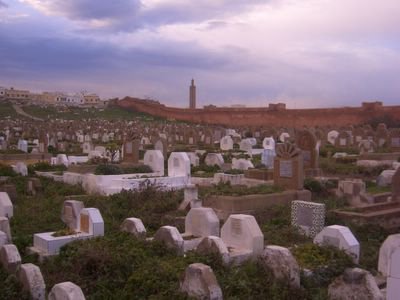
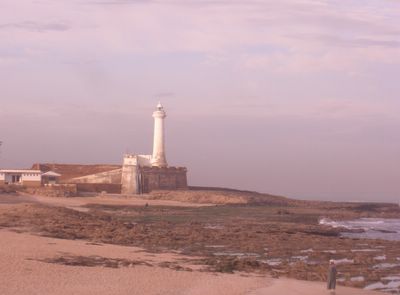
 Walking along the cliff lead me to Plage de Rabat and the Kasbah of the Qudayas. The beach and the ancient fortress were largely deserted at this hour because it was still far too cold for most Moroccans and early in the season for the tourists. It's hard to believe the elements have not completely oblitereated the kasbah. From the kasbah, I walked back into the ancient medina and was encouraged to see stirring of activities. I wandered down the main shopping street of rue Souika before joining other Volunteers for a morning cup of coffee. After coffee, each of us had separate plans and so we said good-bye. My only plan was to get back to my site. I didn't really need anything, so I was just happy to "window-shop" as I strolled passed vendors hissing at me to get my attention.
Walking along the cliff lead me to Plage de Rabat and the Kasbah of the Qudayas. The beach and the ancient fortress were largely deserted at this hour because it was still far too cold for most Moroccans and early in the season for the tourists. It's hard to believe the elements have not completely oblitereated the kasbah. From the kasbah, I walked back into the ancient medina and was encouraged to see stirring of activities. I wandered down the main shopping street of rue Souika before joining other Volunteers for a morning cup of coffee. After coffee, each of us had separate plans and so we said good-bye. My only plan was to get back to my site. I didn't really need anything, so I was just happy to "window-shop" as I strolled passed vendors hissing at me to get my attention.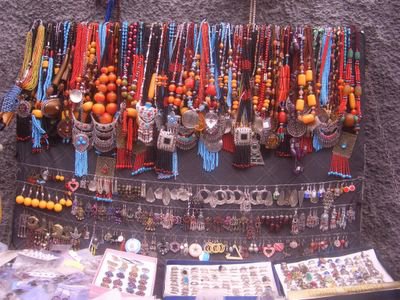
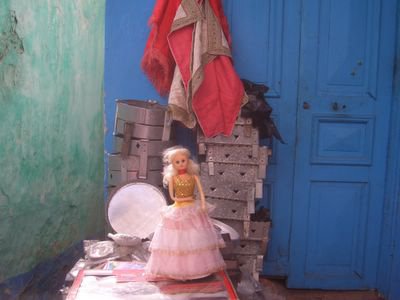
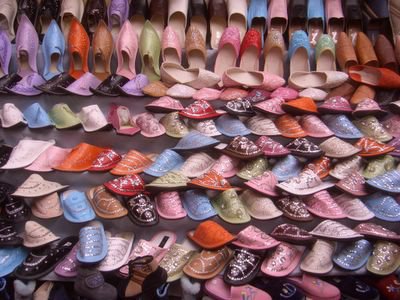
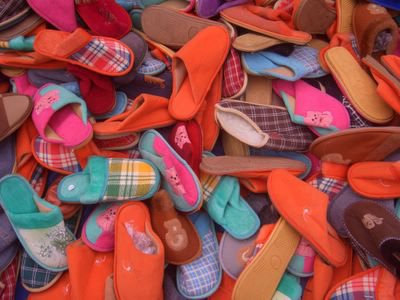
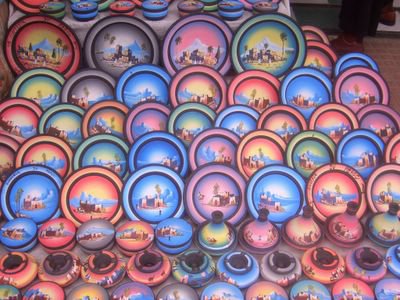
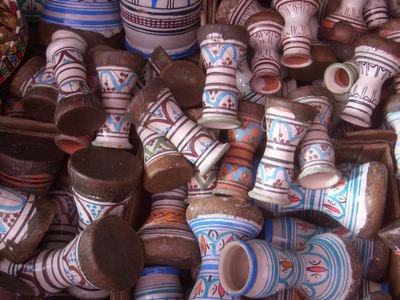
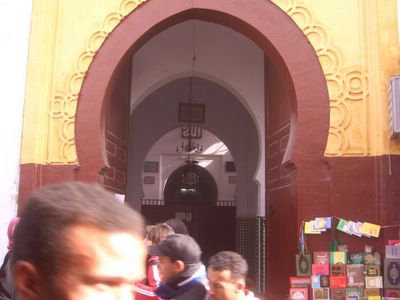

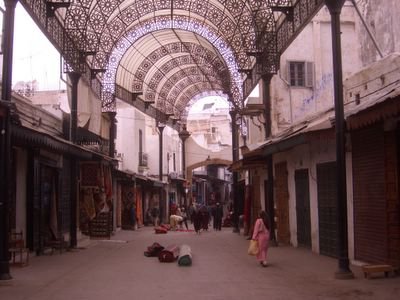
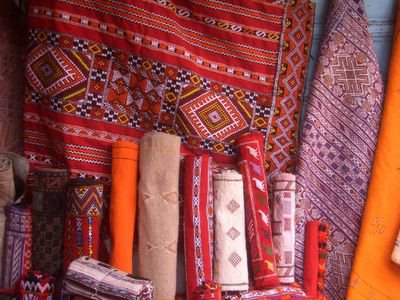
5,000th photo milestone last week i took & kept my 5,000th picture since arriving in morocco; however, the 5,000th absolute picture was taken in mid-december 2005. |
2. Actual names have been changed/withheld for obvious reasons (re: safety/security)
3. Goethe-Institut Rabat is at 7, rue Sana'a, Rabat; tel: 037.73.26.50, down the street from the central post office, I think (it was dark, so I'm not entire sure where we were but I remember passing the clock on the building). I have been to places like this during my time in corporate life; however, I actually felt uncomfortable being in there that night, I think that's because I know that Peace Corps living allowance does not allow me to be here.
4. My homestay family does not believe in sleeping past 7:30am, unless it is an electricity-free day. On most days, the first call to prayer just before dawn wakes me and I rarely make it back to bed..
5. I stayed at Hotel Central at a rate of 120dh a night (room had shower), within Peace Corps allowance in Rabat.: 2 rue Al Basra, Rabat; tel: 037.70.73.56
tags: peace corps.africa.morocco
another point of view ...
You rock! the top picture looks like one of those rock climbing walls. I am glad you are having a good time. I hope you find a nice place to live.
The pictures of the shoes are great.
MQUEST: you're so funny, you have the same thought as my friend who wanted to scale that ancient wall! no place to live yet, but am continuing to look - venturing out to look at apartments even in the rain (explains the cold i have!).
KALLUN: thanks for that - it's just a simple casio digital camera [don't know the model - i'll look it up and email you]. looking forward to your photos!
speak up!
Unknown
You rock! the top picture looks like one of those rock climbing walls. I am glad you are having a good time. I hope you find a nice place to live.
The pictures of the shoes are great.
Nam LaMore
MQUEST: you're so funny, you have the same thought as my friend who wanted to scale that ancient wall! no place to live yet, but am continuing to look - venturing out to look at apartments even in the rain (explains the cold i have!).
KALLUN: thanks for that - it's just a simple casio digital camera [don't know the model - i'll look it up and email you]. looking forward to your photos!
speak up!
previous 10 posts:
- Down to the River
- The Post Office Adventure
- Spring in Khemisset
- Aid Kbir: Sacrifice of the Sheep
- Directorial Debut
- Reflections Upon Reflections
- Personal Portal: Morocco
- McHappy in Morocco
- That Time of Year
- Make Mine Khemisset!






